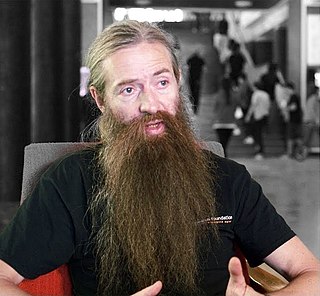A Quote by Brian Kernighan
Programming language is very specific to instructing a computer to do a particular structure of a sequence. It's the very way you tell the machine what you want it to do.
Quote Topics
Related Quotes
We often treat children as if they're not very competent to do anything on their own. So we make them stop learning in a natural way - by exploring. Logo [the computer programming language ] allows them to find their way around the computer, as they would find their way around the house, uncontaminated by the bureaucracies of schools.
I was really looking at computers as a way to understand the mind. But at M.I.T., my mind was blown by having a whole computer to yourself as long as you liked.I felt a surge of intellectual power through access to this computer, and I started thinking about what this could mean for kids and the way they learn. That's when we developed the computer programming language for kids, Logo.
We're not just social animals in the conventional way that people think. It's not just a bunch of us who hang out together. We have a very specific pattern of ties, and they have a particular shape and structure that is encoded in our genes. It means that human beings have evolved to live their lives embedded in social networks.
Language designers want to design the perfect language. They want to be able to say, 'My language is perfect. It can do everything.' But it's just plain impossible to design a perfect language, because there are two ways to look at a language. One way is by looking at what can be done with that language. The other is by looking at how we feel using that language-how we feel while programming.
There is a construct in computer programming called 'the infinite loop' which enables a computer to do what no other physical machine can do - to operate in perpetuity without tiring. In the same way it doesn't know exhaustion, it doesn't know when it's wrong and it can keep doing the wrong thing over and over without tiring.




































